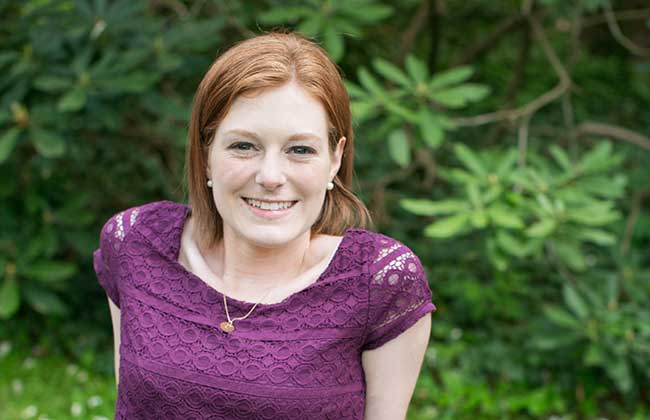Hospital chaplain Liz Niehoff works in an organ transplant unit. She says her work is anything but easy—but also beautiful, life-giving, and miraculous.
By Liz Niehoff
Chaplain offers resurrection hope to organ transplant patients
Walk down the hallways of the Heart and Lung Transplant Unit where I work, and you will see patients with some impressive surgical scars.
If you have the time to pull up a chair and pop open a juice cup, you will hear some pretty incredible testimonies of miracles and resurrections following their transplants. Others are still waiting for a new organ, but eagerly will ask you to share a Boost shake and a tale of where they are in their journey to transplant.
When I felt the call to chaplaincy a few years ago in the midst of seminary, I never envisioned serving transplant patients, hearing stories of resurrection transformation. At times, I am the spiritual guide; at other times, patient listener, truth teller, and stormy sea navigator; and finally, my favorite roles: hair stylist, makeup artist, and joke teller.
For those anticipating an organ, it is a period of waiting—the pre-Easter period, where the patient’s tombstone has yet to be rolled away, and she has yet to shed the clothes of her old illness. I have heard a patient describe it much like Jesus’ three days in the tomb, just before he rolls the stone away and appears again to his disciples. Some have years between diagnosis, listing, and transplant, while others only have weeks and months. Most are able to live at home with their families in this waiting period, attempting to continue some semblance of a “normal” life, while a few must wait in the hospital under the watchful eye of the heart and lung transplant teams. Regardless of how patients and their families come to the transplant process, they receive a visit from a chaplain.
Ministry to those facing what is possibly the end of their lives is anything but easy, and at times can be a spiritual and theological juggling act. Transplant chaplaincy, without a doubt, requires a faith in God’s providence—an understanding that rather than being able to provide the answers to those in this expectant resurrection period, I am there to be the “both/and” chaplain, the person who walks alongside in the midst of the ambiguities and offers words of encouragement and hope in a wilderness not unlike those of Abraham and Moses.
I can remember one patient who waited in the hospital for more than 80 days—what she called her “lung wilderness time.” She had risen and gone to bed each day holding in prayer a donor family she didn’t know, all the while asking God to keep her just healthy enough to survive surgery, yet not healthy enough that she wouldn’t remain at the top of the transplant list. She admitted to me that she had made peace with the time she had spent with her children and grandchildren, but felt restless in her soul in this resurrection-waiting time—that waiting for organs felt both peaceful and expectant and also horribly painful and nerve-wracking. “Waiting and praying for someone to die so that I can live feels very un-Christian, yet I don’t understand how that isn’t any different from what Christ did already,” she told me.
I don’t have all the answers to statements like these, but God does—God who is always present for his people in the midst of the mysteries of illness and tragedy. And what matters most is how we respond as God’s people. Into these dark places God sends his children, the church, to be with those who are suffering most greatly. As a chaplain, I have seen what can only be described as the communion of saints gathering around a single family when illness strikes. As they are being cared for, my role is to assure the family that love persists even in the question-filled darkness, that lament with God is acceptable, and most of all, that God can take our pain and suffering, anger and torment, without shame or guilt. I cannot answer questions, nor can I necessarily lead the families I serve to those answers, but I can encourage families that, to paraphrase Dietrich Bonhoeffer, we believe in a God who suffers alongside us and laments along with us.
Ultimately, I must believe that God is the chaplain and I am merely the vessel for whatever is needed in the situation, whether it be hope, direction, peace, silence, grief, truth, humor, or a new hairdo.
This work is beautiful, life-giving, and miraculous. In the midst of an ever-changing hospital culture, the chaplain is—I am—the one person who can meet people in transition just as they are, where they are—in the resurrection, or before. In hope or in new creation.
Liz Niehoff is a resident chaplain at the University of California, San Francisco Medical Center in San Francisco, California.
Praise God for suffering alongside us and lamenting along with us.
Pray for patients waiting for organ donations as they hope for new life.
Find out how else God is using chaplains by visiting www.rca.org/chaplains.





